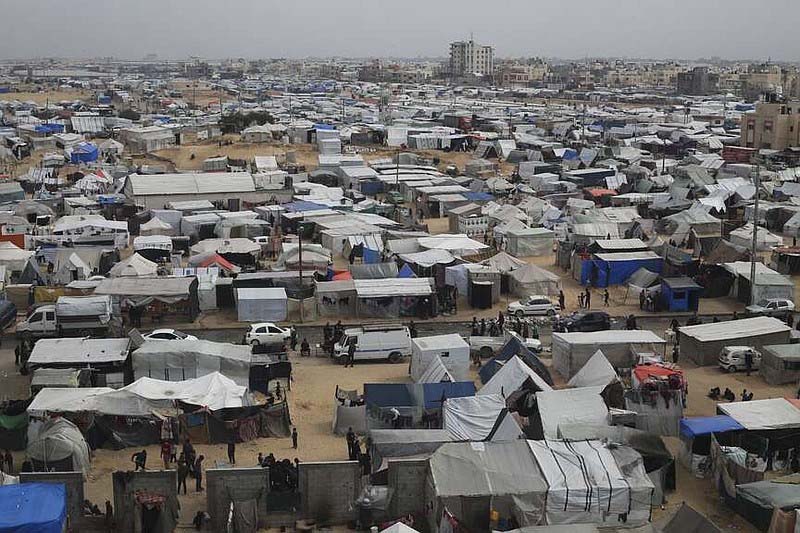Now, let’s delve into the unfolding scenario between Israel and Hamas, where prospects of an imminent breakthrough in cease-fire talks for Gaza are being downplayed. U.S. President Joe Biden, in the context of the Muslim holy month of Ramadan, mentioned that Israel has signaled a pause in its offensive if a deal materializes to release hostages. Biden’s comments, made on the eve of the Michigan primary, underscore his optimism rather than confirming the resolution of all remaining hurdles.
The aftermath of Hamas’ October 7 attack on southern Israel has witnessed Israel’s comprehensive campaign causing significant casualties, decimating urban landscapes, and displacing 80% of Gaza’s population. Concerns over a potential famine loom due to Israel’s restrictive seal on the territory, allowing only a trickle of essential aid. The United Nations, responding to hindered aid deliveries, collaborated with Egypt, Jordan, the United Arab Emirates, Qatar, and France for an airdrop of food, medical supplies, and other necessities into Gaza.
However, the escalating hunger crisis among Gaza’s 2.3 million Palestinians raises alarms. Tragically, two infants succumbed to dehydration and malnutrition at Kamal Adwan Hospital in Gaza City, foreshadowing a perilous rise in infant mortality. The Al Helal Al Emirati maternity hospital in Rafah reports newborn fatalities due to mothers’ inability to access prenatal or postnatal care, coupled with a surge in premature births.
The looming threat of an invasion of Rafah intensifies global concern for approximately 1.4 million trapped civilians. Cease-fire talks gain momentum as negotiators from the United States, Egypt, and Qatar strive to broker a deal involving the release of hostages, a temporary halt in fighting, and increased aid deliveries to Gaza. The onset of Ramadan, around March 10, serves as an unofficial deadline for a potential agreement, considering the historical sensitivity of Israeli-Palestinian tensions during this holy month.
President Biden, anticipating the developments, highlights the agreement that Israelis would refrain from activities during Ramadan, providing time for hostage release. Although expressing hope for a cease-fire deal by the next week, Biden doesn’t explicitly call for an end to the war, initiated by Hamas militants. Israeli officials, caught off guard by Biden’s comments, emphasize the urgency of a deal, but Hamas remains steadfast in its demands.
Hamas, unyielding in its stance, emphasizes its resistance and rejects any compromises that deviate from its initial requests. The intricate negotiations involve complex demands, including the insistence on the inclusion of female soldiers in the first group of hostages released under a truce deal.
Simultaneously, Secretary of State Antony Blinken engages with the foreign ministers of Saudi Arabia and the United Arab Emirates to discuss post-conflict reconstruction and governance of Gaza. While not directly involved in cease-fire negotiations, both countries play crucial roles in supporting the challenging post-conflict scenario and garnering Arab backing for security guarantees for Israel in potential talks on a Palestinian state.
In Doha, Qatar expresses optimism about the ongoing talks, without providing elaborate details. An Egyptian official hints at a draft deal involving the release of hostages in exchange for Palestinian prisoners, a temporary pause in fighting, and a substantial increase in aid deliveries to Gaza. The potential six-week pause aims to facilitate daily aid deliveries, addressing the dire needs of the affected regions.
President Biden, despite his consistent support for Israel, leaves the door open for a potential Israeli ground offensive in Rafah. Netanyahu considers a ground operation in Rafah inevitable for Israel’s strategy against Hamas. Biden acknowledges Israel’s commitment to evacuate portions of Rafah before taking further action, emphasizing the complexity and progression of the process.
As the offensive in Gaza takes a toll, surpassing 29,700 casualties, predominantly women and children, concerns persist over the distinction between fighters and civilians in the count. The intricate dynamics of cease-fire negotiations, humanitarian concerns, and the geopolitical landscape underscore the complexity of the situation, leaving the fate of the region hanging in the balance.




